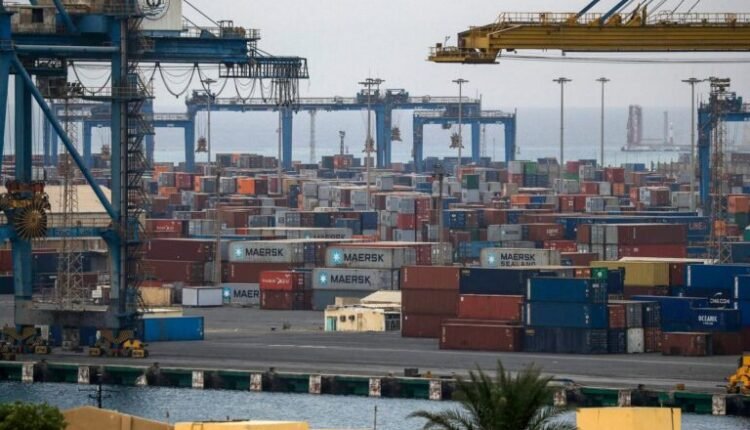Following the UAE’s Air and Sea Freight Boycott, What Possible Alternatives for Sudan?

Sudanhorizon – Nazik Shamam
The decision by the UAE Ministry of Energy and Infrastructure to suspend UAE transactions with Port Sudan, as published on Thursday, August 7, has sparked widespread reactions in economic circles. The politically motivated decision created confusion in the country’s trade activity, given the significant trade between the two countries in recent years.
Despite the political events and the war raging in Sudan for nearly two and a half years between the Sudanese army and the Rapid Support Forces militia, which enjoys UAE support, the two countries have maintained economic cooperation. However, the UAE has brought the economy into the conflict between them.
Sudan Accusations
Sudan accused the UAE of supporting the Rapid Support Forces militia during its war with Sudanese army forces, which has entered its third year. The frequency of accusations has increased after repeated attacks on Port Sudan, involving the use of modern weapons and targeting specific locations. The volume of Emirati investments and development funding in Sudan amounted to AED 28 billion ($7.6 billion), of which $6 billion was in the agricultural sector. There are 17 Emirati companies operating in diverse sectors such as agriculture, tourism, aviation, oil, and gas, according to data from the Emirates News Agency (WAM) dating back to 2018.
Text of the Decision
This new decision prohibits the serving any sailing permits for ships flying the UAE flag and bound for Port Sudan. It also prohibits the handling of any goods or containers, either import or export, originating or destined for Port Sudan, including transit cargo, at all ports and terminals.
Previous Suspension
The action was preceded by the UAE’s suspension of Sudanese airlines and banning them from landing at Abu Dhabi Airport, in an Emirati escalation against Sudan.
A number of businessmen speaking to Sudanhorizon have confirmed that this decision applies to all containers arriving through Emirati ports. Babiker Al-Sheikh, who works in the electrical appliances import industry, explained that the decision issued by the UAE authorities has entered into force.
Babiker told Sudanhorizon that “shipping companies in the UAE informed them that shipping from UAE ports has been suspended and that no ships are allowed to head for Port Sudan.”
He pointed out that the decision has caused confusion, uncertainty, and paralysis in Sudan’s trade, due to uncertainty about its validity. However, Al-Sheikh confirmed that there are alternatives that Sudan could resort to. He expected the impact of the decision to become clear on Monday, after the weekend in the UAE ends.
Significant Impacts
For his part, a source in the Sudanese Chamber of Commerce, who preferred to remain anonymous, said, “It is too early to talk about the economic impact of the UAE’s decision to suspend sea and air shipping to Sudan.” In a statement to Sudanhorizon the source has emphasized that the economic impacts will be significant, given that the UAE is Sudan’s primary trading partner and has relied on it in recent years to import many key commodities, most notably fuel.
He explained that there are many alternatives Sudan could turn to if the decision remains in place for a long time, including Egyptian ports, Djibouti, and the port of Jeddah.
Bridging the Gap
In addition, economic analyst of Egyptian-Sudanese affairs, Munjed Ibrahim, explained Egypt’s ability to bridge the gap with the UAE in most commodities except fuel.
Ibrahim told Sudanhorizon that after the successive events with the UAE and the UAE’s severing of trade, aviation, and transit ties with Sudan, he urged Egypt to get ready to bridge this huge trade gap, explaining that Emirati ports play a major role in trade with Sudan. Ibrahim expected Egypt to be able to bridge this gap and increase trade with Sudan in the coming period, especially in sugar, flour, and basic commodities.
Strangling Sudan Economically
Sumaya Sayed, a journalist specializing in Sudanese economic affairs, indicated that the UAE’s decision to suspend dealings with Port Sudan aims to create potential economic repercussions for Sudan, in an attempt to strangle Sudan economically after the UAE’s military failure with its support for the Rapid Support Forces militia. Sayed explained that the UAE is aware that Port Sudan is the main artery for the country’s imports and exports.
She said, “Although the decision is still recent and its full ramifications are not yet clear, its impact can be analyzed from several perspectives, such as disrupting trade, as Port Sudan is Sudan’s most important commercial gateway.”
Sumaya indicated that the ban on Emirati ships from dealing with the port, whether coming from or going out, will directly impact the flow of goods and products, leading to a shortage of some goods imported from the UAE.
She added, “The rising costs may force Sudanese traders to seek alternative shipping routes through other ports in the region, which could increase transportation and customs costs, negatively impacting commodity prices in local markets.”
Regarding the available alternatives, Sumaya explained that they include opening up to new markets, especially Egypt, because it is the closest and least expensive land transport for imports.
She pointed to the importance of opening foreign markets for Sudanese exports of livestock, grains, and other agricultural produce, with a focus on traditional markets such as Saudi Arabia, the largest market in the Gulf. For Sudanese exports, she called for the government to focus on local alternatives, relying on self-reliance in production, especially agricultural production, to ensure the success of the upcoming agricultural season, which faces significant challenges. She said that the UAE’s decision aims to exert economic pressure, and the government could mitigate its effects by adopting other available alternatives.
Shortlink: https://sudanhorizon.com/?p=6909

